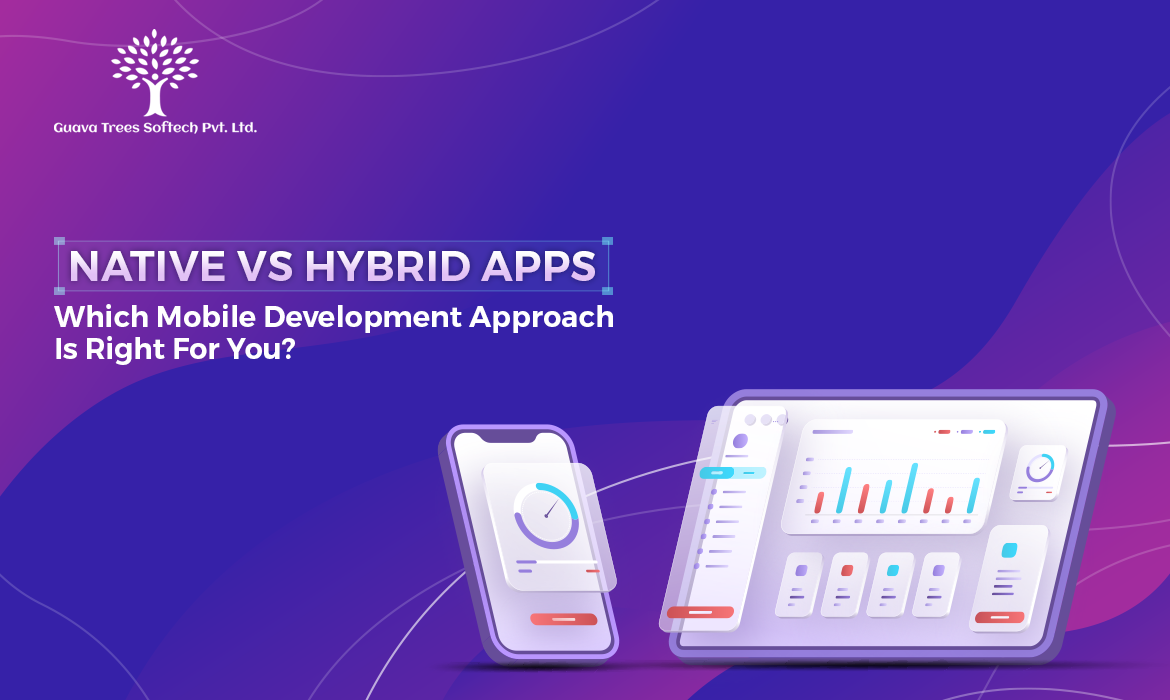Mobile applications have become an ubiquitous entry point for businesses to reach customers in this increasingly digital landscape.
Whether you are a startup or an enterprise, determining how to develop your app is a vital consideration in your journey.
With countless considerations to make, the majority of businesses rely on native and hybrid mobile app development approaches. Important similarities, differences, advantages, disadvantages, etc. are present between native and hybrid apps, and I wanted to outline some of the main distinctions, advantages, and disadvantages of both in this blog post so you can make the best decision for your project.
What is Hybrid App Development?
Hybrid applications are typically developed using web technologies such as HTML, CSS, and JavaScript. They run inside native containers (like WebView), allowing them to function across multiple platforms using a single codebase. Frameworks like Ionic are commonly used for this approach. For more performance-oriented cross-platform solutions, React Native and Flutter are also popular—though they follow a different architecture than traditional hybrid apps.
Key Characteristics of Hybrid Apps:
- Multiple platform compatibility in a same codebase.
- Built using web technologies.
- Wrapped in a native shell.
- Able to be submitted to app stores.
Benefits of Hybrid Apps
- Cross-Platform Compatibility: An iOS and Android codebase can be published together.
- Low Cost:Lower development and maintenance costs by writing once on only one codebase.
- Fast Development:one team can work on one app for all platforms, speeding up release.
- Easy Maintenance: Since one list is being used, updates and bug fixes are done all-around.
- Increased Reach:Releasing the app on multiple platforms gives as many users the chance to see our app.
Drawbacks of Hybrid Apps
- Performance Problems:Hybrid apps often fail to perform smoothly like native apps, especially with apps that leverage extensive animations or heavy-use processing.
- Less Native Feature Access:You may be able to get around many of the limitations, using third-party plugins, but you cannot fully take advantage of your devices features as you would if it were natively developed.
- User Experience Downfalls:The UI may not perfectly mimic the numerous design conventions required for the look and feel that appear native to each platform.
- A Dependence on Plugins for some Native Functionality:Many instances require you to use third-party plugins to tap into native functionality, that is not always reliable or current.
- Debugging is Difficult:There is some added complexity because you are using two technologies – native and web – so debugging is a little more challenging.
What is Native App Development?
To create hybrid apps, web technologies like HTML, CSS, and JavaScript are utilized.
The program can be distributed across multiple platforms using a single codebase because they are running in a native container.
Developers use platform specific programming languages and tools to build everything from coding and design. For Android, developers use Swift or Objective-C, and for iOS, Kotlin or Java.
Native Apps key characteristics:
- multiple platform compatibility in a same codebase.
- Designed to utilize device hardware and capabilities.
- Designed with the platforms UI/UX interfaces.
Benefits of Native Apps
- Greater Performance:Native applications are compiled into machine code which results in faster applications that are more responsive.
This is particularly useful in applications that work with heavy graphics and/or require real-time features. - Smooth User Experience:Native applications adhere to the design principles and elements of each respective operating system which results in a user experience that is intuitive.
- Improved Access to Device Features:All system functionality, including the GPS, camera, accelerometer, push notifications, and more, can be directly accessed by native apps.
- Improved Security:Native applications can take advantage of security tools and protocols that are specific to a given platform keeping more vulnerabilities at bay.
- Easier Scalability:Native applications scale features and performance across devices easily.
Disadvantages of Native Apps
- Costly:Creating and maintaining separate codebases for both Android and iOS is costly in both time and money.
- Longer:In order to create an app in two versions, it takes significantly longer.
- Complex Maintenance:Bugs once discovered and fixed must be fixed and updated in both Android and iOS separately.
Native Vs Hybrid: A Comparison
| Feature | Native Apps | Hybrid Apps |
| Performance | High (optimized for platform) | Moderate (depends on web view) |
| Development Time | Longer | Shorter |
| Cost | Higher (two codebases) | Lower (single codebase) |
| User Experience | Excellent | Varies by implementation |
| Device Feature Access | Full | Limited (depends on plugins) |
| Maintenance | Complex | Easier |
| Platform Consistency | Platform-specific | Cross-platform |
When Should You Choose Native Mobile App Development?
If you meet any of the following criteria, go with native development:
- You need high performance (i.e., AR/VR apps or gaming apps).
- Hardware features must be fully accessible to the app.
- You desire the smoothest, most consistent user experience across all platforms.
- Neither budget nor time are a concern.
- You foresee scaling-up and maintaining this app long-term.
When Should You Choose Hybrid Mobile App Development?
Choose hybrid development if any of the following conditions are true:
- You want to get in front of iOS and Android users as soon as possible.
- Budget is a consideration.
- Your app is simple or content-based (i.e., MVPs).
- You need rapid time-to-market.
- You are trying to validate an idea before putting too much investment into it.
Conclusions
The question of whether to design a native or hybrid mobile app is not universally applicable.
It largely depends on your long-term objectives, target audience, budget, and project needs.
While hybrid apps offer quicker development cycles and cost savings, native apps offer better performance and user experience.
For your mobile app strategy to be well-informed, you must comprehend the trade-offs between these two techniques.
Engaging, satisfying, and growing mobile experiences may be achieved by matching your development approach to your business objectives and user expectations.







